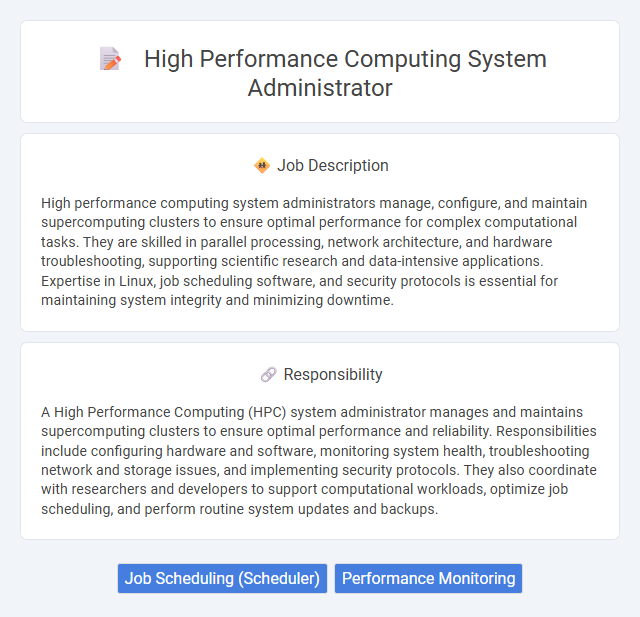
High performance computing system administrators manage, configure, and maintain supercomputing clusters to ensure optimal performance for complex computational tasks. They are skilled in parallel processing, network architecture, and hardware troubleshooting, supporting scientific research and data-intensive applications. Expertise in Linux, job scheduling software, and security protocols is essential for maintaining system integrity and minimizing downtime.
Individuals with strong analytical skills and a passion for technology are likely suitable for a High Performance Computing (HPC) system administrator role. The job may demand long hours and high-pressure problem-solving, making it more fitting for those who thrive in dynamic and challenging environments. Candidates who prefer routine and low-stress tasks might find this position less compatible with their temperament.
Qualification
Expertise in managing high performance computing (HPC) systems requires a strong foundation in computer science or information technology, often supported by a bachelor's or master's degree. Proven experience with Linux/Unix system administration, parallel computing architectures, job scheduling software (e.g., SLURM, PBS), and cluster management tools is essential. Proficiency in scripting languages such as Python or Bash, along with skills in hardware troubleshooting and network configuration, enhances the ability to optimize HPC infrastructure performance.
Responsibility
A High Performance Computing (HPC) system administrator manages and maintains supercomputing clusters to ensure optimal performance and reliability. Responsibilities include configuring hardware and software, monitoring system health, troubleshooting network and storage issues, and implementing security protocols. They also coordinate with researchers and developers to support computational workloads, optimize job scheduling, and perform routine system updates and backups.
Benefit
High performance computing system administrators likely gain significant benefits such as enhanced technical expertise in managing advanced computing resources and improved problem-solving skills with complex computational systems. They probably enjoy competitive salaries and opportunities for career growth within cutting-edge technology environments. Access to collaborative projects and research initiatives may also provide valuable professional development and networking advantages.
Challenge
Managing a high performance computing system likely involves complex challenges such as maintaining system stability under heavy workloads and troubleshooting hardware or software failures that can disrupt critical operations. The administrator probably faces constant pressure to optimize resource allocation and ensure security in an environment where even minor downtime can have significant consequences. Balancing rapid technological advancements with legacy system compatibility may also pose ongoing difficulties in sustaining peak system performance.
Career Advancement
High performance computing system administrators manage advanced computing infrastructures essential for scientific research and data analysis, overseeing cluster performance, security, and maintenance. Mastery of parallel computing, job scheduling, and system optimization opens pathways to senior roles such as HPC architect, research computing director, or systems engineering manager. Continuous skill enhancement in emerging technologies like GPU computing and cloud-based HPC environments accelerates career progression in this specialized IT sector.
Key Terms
Job Scheduling (Scheduler)
High performance computing (HPC) system administrators specialize in managing job scheduling systems like Slurm, PBS, or LSF to optimize resource allocation and maximize cluster efficiency. They configure and maintain schedulers to handle workload prioritization, job queues, and resource reservations, ensuring minimal job wait times and balanced usage of CPUs and GPUs. Expertise in scheduler policies and job dependencies is critical for maintaining high throughput and effective parallel job execution in HPC environments.
Performance Monitoring
High performance computing system administrators specialize in performance monitoring to ensure optimal functionality and resource utilization of HPC clusters. They employ advanced tools such as Ganglia, Nagios, and Prometheus to track system metrics, identify bottlenecks, and analyze workload efficiency. Continuous performance tuning enhances computational throughput and minimizes latency, directly impacting scientific research and data-intensive applications.
 kuljobs.com
kuljobs.com